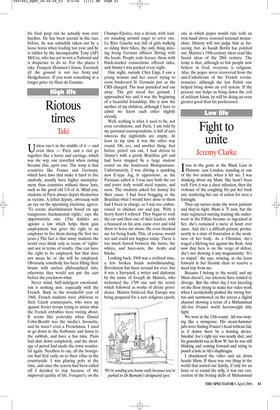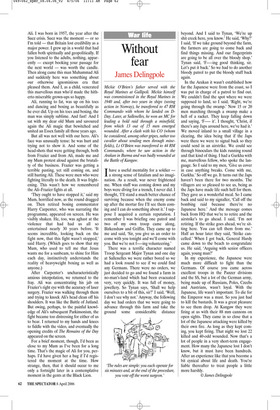Fight to unite
Jeremy Clarke
Iwas in the gents at the Black Lion in Plaistow, east London, standing at one of the two urinals, when it hit me. I was thinking about my Mum. She hasn’t been well. First it was a chest infection, then the violence of the coughing fits put her back out, rendering her out of action for over a fortnight.
They say nurses make the worst patients and they’re right. Mum is 75 now, but the state registered nursing training she underwent in the Fifties became so ingrained in her, she’s remained a nurse at heart ever since. And she’s a difficult patient, permanently in a state of frustration at the weakness of her body. As a Christian, she’s waged a lifelong war against the flesh. And now that hers is on the verge of defeat, she’s not showing it any magnanimity. ‘It’s so stupid,’ she says, wincing, as she leans forward in her fireside chair to receive a meal tray from me.
Because I belong to the world, and my Mum doesn’t, our interests have tended to diverge. But the other day I was kneeling on the floor trying to make her video work when I accidentally pushed the wrong button and summoned on the screen a digital channel showing a rerun of a Muhammad Ali–Joe Frazier world heavyweight title fight.
We were in the 13th round. Ali was swaying like a mongoose. His steam-hammer jabs were finding Frazier’s head without fail, as if drawn there by a homing device. Smokin’ Joe’s right eye was nearly shut, and his gumshield was in Row W, but he was still blinking and coming forward and trying to punch a hole in Ali’s diaphragm.
I abandoned the video and sat down beside Mum. If there was one thing in the world that united our family, if only for an hour or so round the telly, it was our veneration of the boxing skills of Muhammad Ali. I was born in 1957, the year after the Suez crisis. Suez was the moment — or so I’m told — that Britain lost credibility as a major power. I grew up in a world that had fallen both spiritually and geopolitically. If you listened to the adults, nothing, apparently — except booking your passage for the next world — was worth the candle. Then along came this man Muhammad Ali and suddenly here was something about our otherwise ignominious era that pleased them. And I, as a child, venerated this marvellous man who’d made the hitherto miserable grown-ups so happy.
Ali, running to fat, was up on his toes and dancing and boxing as beautifully as he ever did. Up on his toes and boxing, the man was simply sublime. And fast! And I sat with my dear old Mum and savoured again the Ali magic that bewitched and united an Essex family all those years ago.
But all was not well with our hero. Ali’s face was unusually tense: he was hurt and trying not to show it. And some of the head-shots that were getting through, both from Frazier and from Ali, made me and my Mum protest aloud against the brutality of the business. Frazier was getting a terrible pasting, yet still coming on, and still hurting Ali. These were men who were fighting literally to the death. It was frightening. This wasn’t how we remembered the Ali–Frazier fights at all.
‘They ought to have stopped it,’ said my Mum, horrified now, as the round dragged on. Then retired boxing commentator Harry Carpenter, who was narrating the programme, appeared on screen. He was visibly shaken. He, too, was aghast at the violence that had had us all so entertained nearly 30 years before. ‘It seems incredible, looking back on the fight now, that this fight wasn’t stopped,’ said Harry. (Which goes to show that my Mum, who used to tell me that Jesus wants me for a sunbeam, to shine for Him each day, instinctively understands the reality of heavyweight boxing as well as anyone.) After Carpenter’s uncharacteristically anxious interpolation, we returned to the fray. Ali was concentrating his jab on Frazier’s right eye with the accuracy of laser surgery. Frazier was walking through them and trying to knock Ali’s head clean off his shoulders. It was like the Battle of Jutland. But owing, perhaps, to the painful knowledge of Ali’s subsequent Parkinsonism, the fight became too distressing for either of us to bear. I returned to my hands and knees to fiddle with the video, and eventually the opening credits of The Remains of the Day appeared on the screen.
For a brief moment, though, I’d been as close to my Mum as I’ve been for a long time. That’s the magic of Ali for you, perhaps. I’d have given her a hug if I’d registered the moment at the time. How strange, then, that it should occur to me only a fortnight later in a contemplative moment in the gents at the Black Lion.











































































 Previous page
Previous page